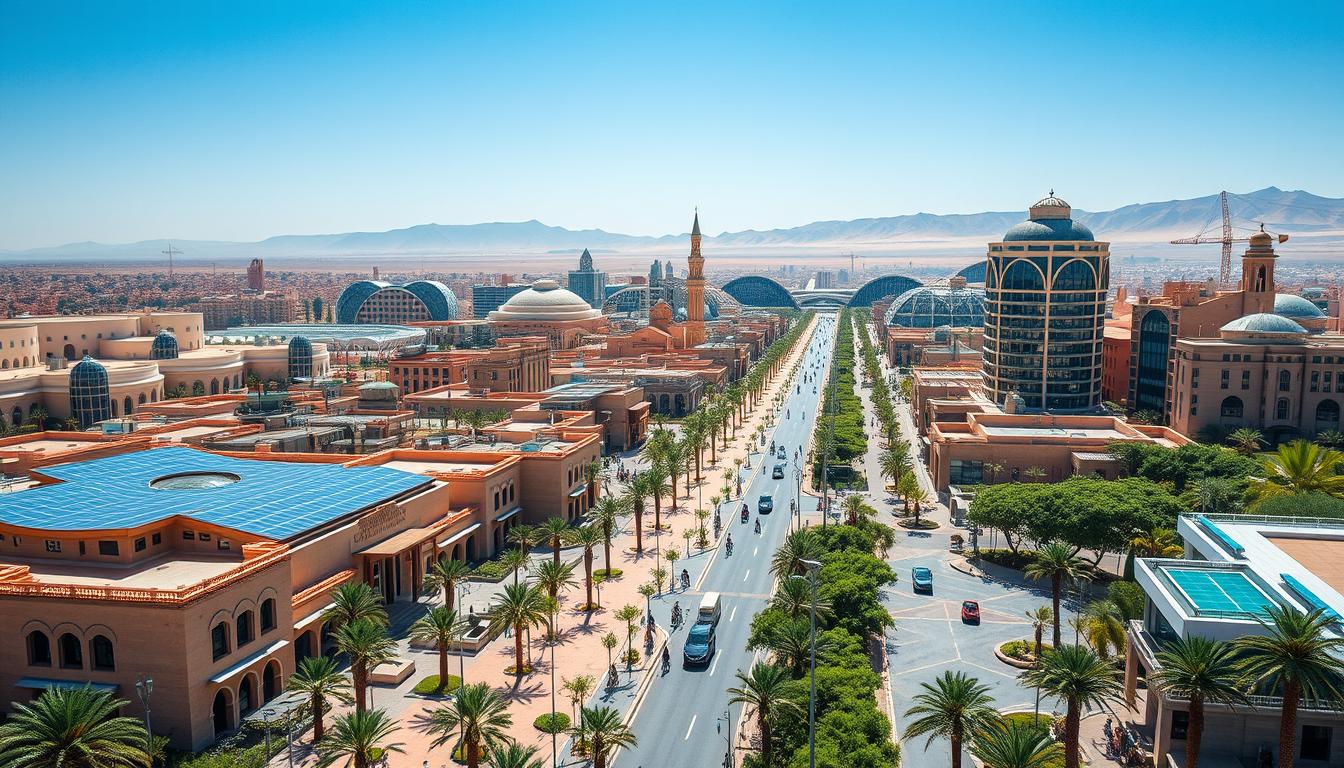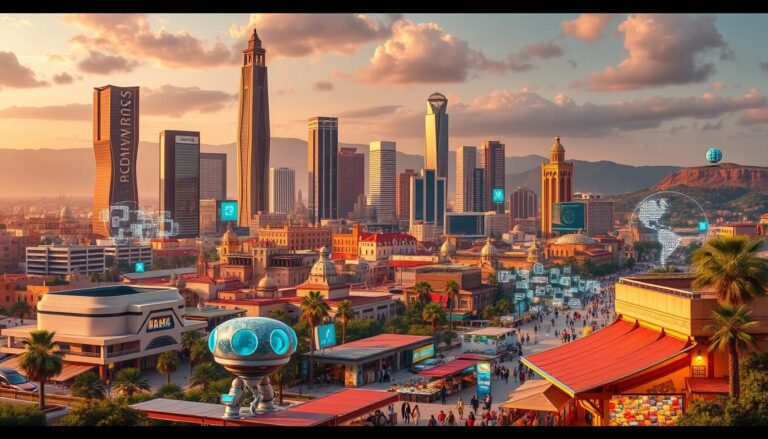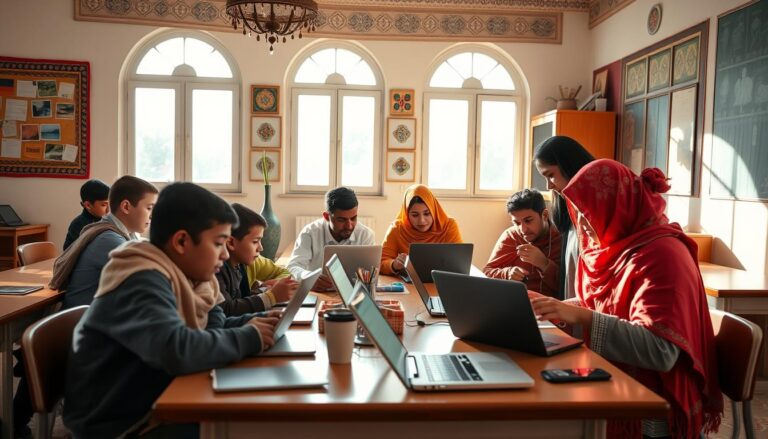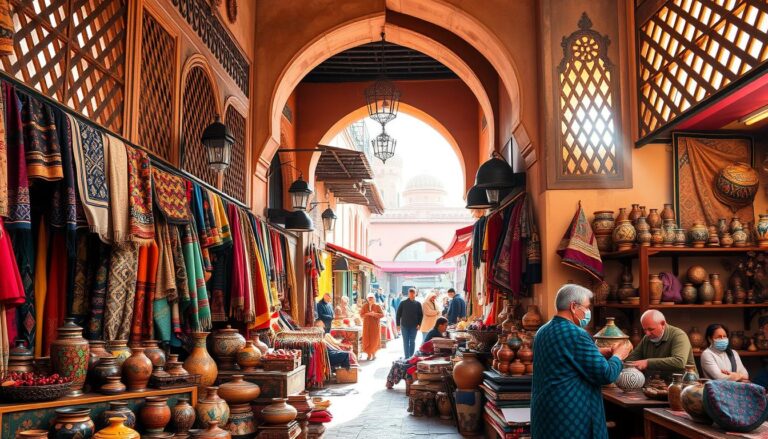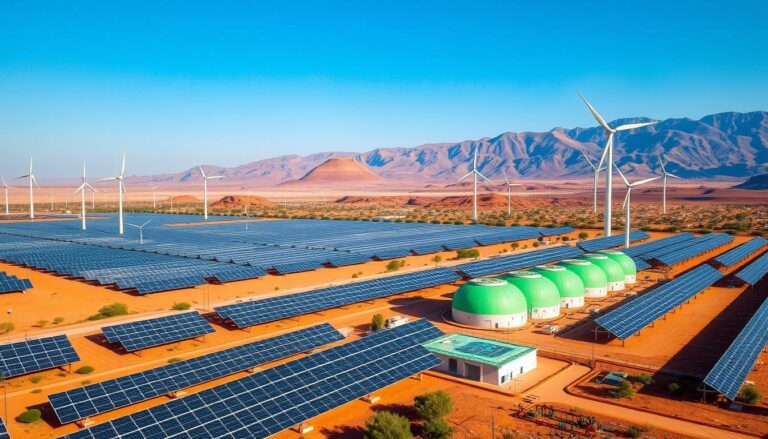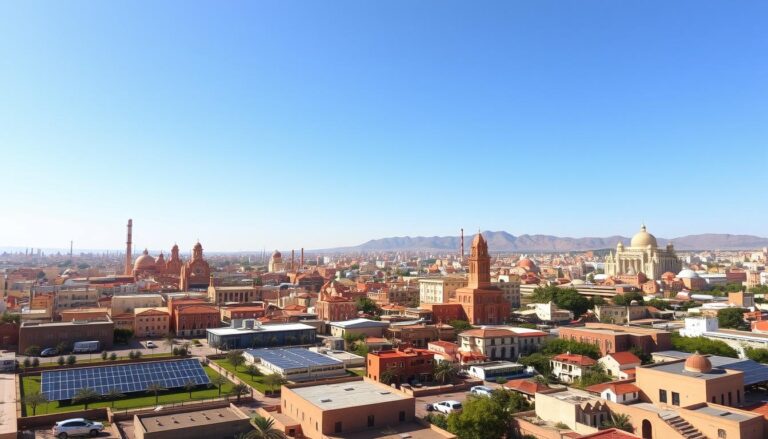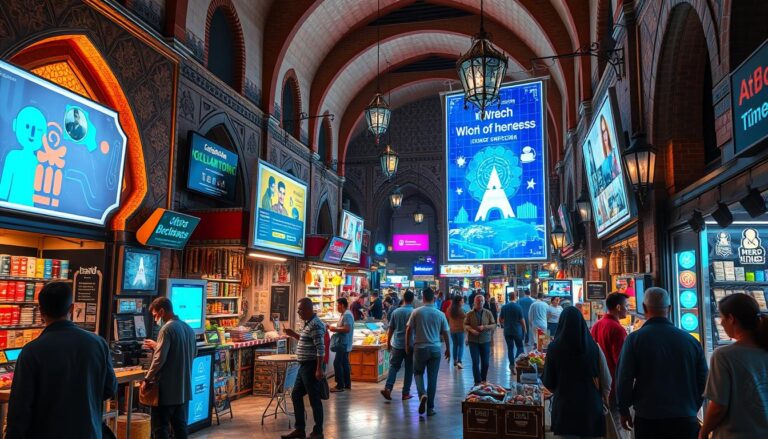Can a country’s focus on green cities and new ideas change Africa’s future? Morocco is trying with its Smart City Initiatives. They use the latest tech and smart planning. Projects like Casablanca’s $500-million waterfront show Morocco’s vision for cities that save energy and move people smoothly.
Morocco is ready for a digital and green shift, thanks to 85% internet use and almost all smartphones. Their plans match the United Nations’ goals for a better world. But what makes Morocco’s urban plans special?
Introduction to Morocco’s Smart City Development
Morocco is working hard to make its cities smarter. This is to tackle big issues like growing populations and outdated infrastructure. The country is investing in education, like a Master’s program on smart city strategies in Africa.
This shows Morocco’s commitment to making cities better for everyone. It’s not just for Morocco but for the whole continent.
The Morocco smart cities strategy aims to meet the needs of cities’ growing populations. By 2040, cities will need more space and services. The focus is on building better infrastructure and training people for the digital age.
IBM is helping Morocco’s cities go digital. They started the “Smarter Cities” project in 2011. IBM has worked with cities like New York and Madrid to improve their systems.
Big Data and other technologies are key to this effort. They help businesses, big and small, understand their markets better.
Smart city development in Morocco covers six key areas. These are smart economy, mobility, environment, people, living, and governance. This approach aims to make cities better places to live and work.
By encouraging innovation, these cities attract businesses and creative people. They become centers for new ideas and products.
The digital transformation in Moroccan cities is a team effort. The 1st International Summit for Smart Cities in North-Africa was a big event in 2014. It brought together officials, researchers, and tech companies to talk about growth and governance.
Events like this show Morocco’s role in leading smart city projects in Africa. It’s all about working together to make cities better.
Partnerships, like between Al Akhawayn University and Ifrane’s municipality, are key. They help use technology in ways that work for local communities. Morocco wants to be a model for smart city development in Africa.
The Role of Education in Morocco’s Smart Cities
Morocco values education highly in its quest for smart cities. It aims to make six cities, including Casablanca and Marrakech, smart by 2026. The focus is on teaching the population to use new technologies.
Smart City Strategies in Africa
Smart city planning is growing in Africa. Morocco’s education system is adapting to this trend. It aims to improve urban planning and reduce costs.
This effort includes sectors like transport and energy. It ensures sustainable growth in cities.
Partnership with Swiss Institutes
Morocco has teamed up with Ecole Polytechnique de Lausanne in Switzerland. This partnership has led to new programs at Mohamed VI Polytechnic University. These programs focus on smart city strategies.
Students learn about engineering, social sciences, and digital skills. This gives them a broad understanding of urban planning.
Courses and Training Modules
The education in Morocco’s smart cities includes various subjects. Eight core modules cover important skills like connectivity and AI. These modules prepare students for the challenges of modern urban planning.
These solutions are key to creating efficient and sustainable smart cities. They improve the quality of life for the population.
Strategic Goals of Morocco’s Smart Cities
The main goals of Morocco’s Smart City Initiatives are to make cities efficient and sustainable. They focus on smart city technology to benefit society and the economy. This is through strategic urban planning.
Morocco has a two-year plan to achieve these goals. They are working with the Ecole Polytechnique de Lausanne in Switzerland. This partnership aims to develop smart city strategies in cities like Casablanca, Tangier, and Marrakech.
These cities are key in Morocco’s digital transformation. They will use innovative smart city technology.
Key elements of this planning include:
- Creating smart infrastructure to reduce traffic congestion. This could save 2% of Africa’s GDP.
- Working on sustainable development goals, as seen at the Smart City Expo in Casablanca. This aligns with the United Nations SDGs.
- Expanding training and education, like the master’s degree in smart city strategies at Mohamed VI Polytechnic University (UM6P).
Morocco aims to be a leader in the region. They want to set a benchmark for other African cities. They also want their cities to be at the forefront of technology and sustainability.
By focusing on strategic planning and smart technology, Morocco is creating efficient, secure, and thriving cities.
This forward-thinking approach is vital. By 2040, over half of Africa’s population will live in cities. Cities like Casablanca are already preparing by installing urban video surveillance and digital infrastructure.
These efforts are part of Morocco’s strategy to improve life quality, encourage innovation, and enhance urban management with advanced technologies.
Key Smart City Projects in Morocco
Morocco is working on many smart city projects to improve urban life. The Casablanca Marina, Morocco Mall, and Tamesna New City are major projects. They are key to Morocco’s urban growth.
Casablanca Marina Project
The Casablanca Marina is a big smart project in Morocco. It’s a $500-million investment in a modern waterfront. It will have homes, shops, and places for fun, making it a key spot for business and tourism.
Morocco Mall
The Morocco Mall is a big deal in Casablanca. It’s a fancy mall for high-end shoppers. It helps local businesses and draws tourists, making Casablanca a top spot for shopping and business.
Tamesna New City
Tamesna New City shows Morocco’s focus on green and fair cities. It aims to solve housing problems for the poor and middle class. It has parks, good public transport, and important services, making it a great place to live.
The Impact of Morocco’s Smart City Initiatives
Morocco’s smart city projects are changing urban life for the better. They aim to make six cities smart by 2026, starting with Casablanca in 2016. The goal is to improve how cities work, making them more efficient and sustainable.
Smart cities in Morocco focus on six key areas: economy, mobility, environment, life, people, and governance. They use new technologies to better public services and urban systems. This involves working together with many groups, including businesses and citizens.
Morocco’s smart city efforts bring many benefits, like better efficiency and less environmental harm. They also create jobs for many professionals, ensuring growth in all areas.
With most Moroccans living in cities, there’s a big need for green solutions. The country aims to cut greenhouse gas emissions by 17% by 2030. This goal is part of Morocco’s commitment to sustainable growth.
Big tech companies like IBM are helping build these smart cities. The National Sustainable Development Strategy aims for green and inclusive cities. The Global Green Growth Institute also supports Morocco’s efforts, focusing on energy and waste management.
Technological Innovations in Moroccan Smart Cities
Moroccan smart cities are changing urban development with new technologies. They use big data, AI, advanced connectivity, and digital governance. These innovations help make cities more efficient, responsive, and adaptable.
By using these technologies, Moroccan cities aim to manage resources better. They want to improve public services and get citizens more involved. This will lead to smarter and more sustainable communities.
Big Data and Artificial Intelligence
Big data is key in Morocco’s smart city plans. Cities like Casablanca hope to cut water use for irrigation by over 35%. They also aim to reduce energy use for street lights by 45%.
Big data helps city planners make better decisions. It leads to better management of urban resources and quick solutions to problems. AI takes it further by analyzing data to predict and solve issues.
Connectivity Advances
Connectivity is vital in Moroccan smart cities. IoT devices allow for real-time monitoring and management of infrastructure. This ensures that different city systems work well together.
Improved network connectivity helps with traffic, safety, and emergency responses. Moroccan engineers are trained to implement and maintain these smart solutions.
Digital Governance
Digital governance is changing how public services are delivered. Digital platforms, like those from Indra’s Minsait, have improved citizen service by 25%. Strong digital governance frameworks bring transparency, accountability, and citizen involvement.
Casablanca is a great example of this progress. It has seen a more engaged and informed population. Moroccan cities’ adoption of these technologies will greatly impact urban living and sustainability.
The growth in big data, AI, connectivity, and digital governance shows Morocco’s dedication to smart, efficient cities. These advancements are shaping the future of urban environments.
Case Study: The Zenata Eco-City
The Zenata Eco-City is a prime example of Morocco’s dedication to green and smart urban planning. It’s a key project aimed at boosting the economy and making Morocco a global leader. This city is part of a larger plan to create new cities for growth.
Strategic Blueprint Development
The Zenata Eco-City has a bold plan for the future. It was started in 2006 and fits perfectly with Morocco’s big city-building plans. The city will have lots of green spaces and innovation centers, following a sustainable Eco-city strategy.
Environmental Sustainability Features
Zenata Eco-City focuses on being green. It has big parks, smart waste systems, and uses clean energy. These features help make the city better for the environment and people’s health.
Economic and Social Impacts
The Zenata Eco-City will have big effects on jobs and society. It’s designed to create many jobs and help everyone grow together. It’s also a model for Africa, showing how good planning can improve both the economy and people’s lives.
Since 2004, Morocco has been building new cities. The Zenata Eco-City is a big part of this effort. It’s expected to grow a lot by 2030, helping Morocco’s urban growth.
The Role of Public and Private Partnerships
In Morocco, public-private partnerships are key to the country’s smart city dreams. They mix government plans with private sector creativity. This mix helps fund smart city projects well.
These partnerships shine in urban development. Projects like the Casablanca Marina and Tamesna New City show their power. Private money brings new ideas, while the government guides the way.
Also, European loans and investments show the value of working together. In 2022, Morocco got $2.1 billion in foreign investment. Countries like France, the UAE, and Spain helped a lot. This money is vital for big city projects.
These partnerships also boost tech and green practices for smart cities. They balance private speed with public goals. This balance makes Morocco’s smart city goals reachable and lasting.
So, these partnerships are key to Morocco’s city change. They open up resources and skills needed for the country’s smart city plans.
Challenges Facing Smart City Development in Morocco
Creating smart cities in Morocco is a big challenge. It requires balancing fast urban growth with green practices. The 2014 census showed cities are growing outside, taking up natural areas. This calls for better rules and plans.
Even with laws like the Framework Law for the Environment in 2014, issues remain. Morocco needs to manage land use better, especially with its growing population. Studies looked at 27 urban areas to find a balance between growth and the environment.
Building strong infrastructure is also key. Morocco plans to make six cities smart by 2026, starting with Casablanca in 2016. This will need a lot of money and careful planning for sustainable growth. Solving these problems will require a complete approach, covering both technical and social aspects.
Getting people to use smart city services is also important. Factors like how well services work and how easy they are to use matter. Citizens need to trust and understand these services for them to work well.
Cybersecurity is another big issue. Experts say smart cities face many cyber risks. In 2020, a survey showed the need for better security to protect urban systems.
To overcome these challenges in Moroccan smart cities, a thorough and integrated strategy is needed. Morocco aims to create cities that are ready for the future, balancing growth with sustainability.
Future Prospects of Smart Cities in Morocco
Morocco is moving towards a big change in its cities by 2040. They want to make cities smarter, more connected, and green. This will change how people live in cities.
Vision for 2040
Morocco plans to make cities smarter by 2040. They want to use technology to make life better for everyone. Cities like Casablanca are already leading the way.
Potential Economic Benefits
Smart cities can bring big economic gains. They attract new businesses and create jobs. This helps the economy grow.
Good city planning can also save money. For example, better traffic management saves time and money. By 2035, 70% of Moroccans will live in cities. Smart planning is key for growth.
Projected Urban Growth
More people will move to cities in Morocco. This is a big challenge. But, Morocco is leading the way in making cities sustainable.
Studies show how important it is to manage growth well. This helps balance people’s needs and the environment. Morocco needs a strong plan for this.
Morocco’s Commitment to Sustainability
Morocco is deeply committed to sustainability in its smart city plans. It focuses on energy efficiency and green urban planning. This shows Morocco’s dedication to sustainable urban growth.
Energy Efficiency Initiatives
Morocco is working hard on energy efficiency in cities. It plans to increase clean energy research funding to €80 million by 2023. The goal is to get 52% of power from renewables by 2030, with solar, wind, and hydro leading the way.
Green Spaces and Urban Planning
Green spaces are key in Morocco’s urban planning. They make cities better to live in and help the environment. By 2020, renewable energy made up 42% of Morocco’s electricity.
Ecological Transition Strategies
Morocco’s ecological plans are central to its urban strategy. It aims to reduce environmental harm and promote eco-friendly habits. The use of renewable energy and falling costs show Morocco’s commitment to a green future.
Conclusion
Morocco’s Smart City Initiatives show a big change towards better and smarter cities. They are based on careful planning. This shows Morocco’s goal to lead in urban development in Africa.
They have made big steps in education, tech, and working with private companies. This creates a strong base for smart cities.
In Africa, Morocco’s efforts could be a key example for others. They use their phosphate resources and work with global partners. For example, trade with China has grown by about 50% since 2017.
They also built the Tangier Tech City. This shows Morocco’s smart way to join global markets.
Morocco plans to finish big projects like the Marrakech to Agadir railway by 2030. They also keep using new digital technologies. This progress helps Morocco grow and shows a way for other cities to develop.
As cities face fast growth, Morocco’s smart city example shines. It shows how to develop cities in a sustainable and innovative way.
Source Links
- Instant Urbanism Brings ‘Mega Projects’ to Morocco
- ISC Summit
- Determinants of a smart city in Morocco
- Morocco will share its knowledge of smart cities in Africa
- Éco-Cité Zenata: a Smart Strategy for a Future City — by Anteverti
- MOROCCO: a training course on smart city strategies in Africa launched in Ben Guerir | Afrik 21
- Top Smart Cities in Morocco for 2024: A Statistical Analysis – Reportertales
- Morocco green cities and territories development
- Sustainable Mobility with Renewable Energies in Morocco – Changing Transport
- Minsait to implement a smart city in Casablanca which will serve as a model for the urban modernization of Morocco
- World Bank Document
- Assessment of Sustainability Development in Urban Areas of Morocco
- Morocco – United States Department of State
- Urban Sustainability Development in Morocco, a Review
- Cyber-securing Morocco’s smart cities: A case review
- Plans and priorities – Mission Innovation
- Morocco’s path to a climate-resilient energy transition: identifying emission drivers, proposing solutions, and addressing barriers
- Why Morocco is a Key Player in China’s Belt and Road Initiative — The Fletcher Forum of World Affairs
- Contextualizing the Smart City in Africa: Balancing Human-Centered and Techno-Centric Perspectives for Smart Urban Performance

The Editorial Team is a passionate group of Morocco enthusiasts dedicated to sharing the beauty, culture, and wonders of this captivating country. With diverse backgrounds and a deep love for travel, we strive to bring you engaging and informative content that inspires your Moroccan adventures. From uncovering hidden gems and sharing local insights to exploring mouthwatering cuisine and showcasing the vibrant lifestyle, our team is committed to providing you with valuable resources and exciting stories that enhance your exploration of Morocco. Join us on this journey as we celebrate the rich heritage and unforgettable experiences that make Morocco truly special.

